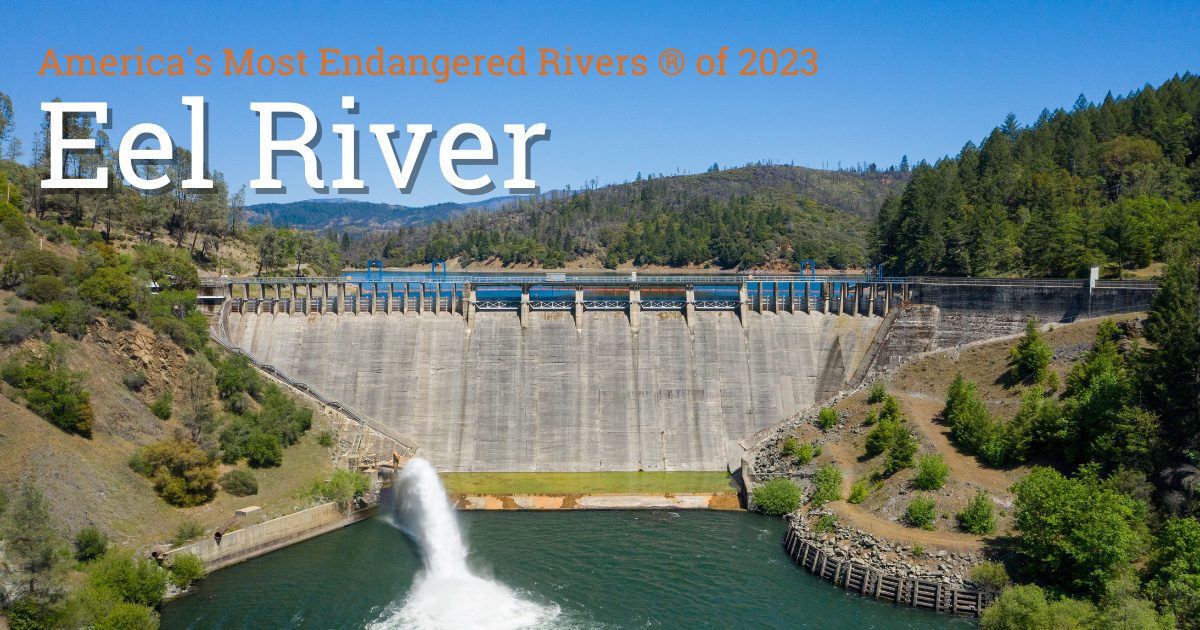Eel River Named one of America’s Most Endangered Rivers of 2023
The Eel River was named one of America's Most Endangered Rivers of 2023 by American Rivers. Tell the Federal Energy Regulatory Commission to prioritize the removal of two dams on the river that are preventing recovery of critically endangered salmon now!
Restoring fish passage in the Eel River watershed will...
- Facilitate salmon recovery
- Restore cultural connections
- Create California’s longest free flowing river
What does it mean to be one of America's Most Endangered Rivers?
"From dams and outdated water management to toxic pollution and development projects that would devastate river habitats, this report spotlights ten rivers in the U.S. that are at a crossroads and whose fates will be decided in the coming year. This year’s list underscores how essential rivers are for human health, public safety, and community wellness." - American Rivers
Why is the Eel River on this list?
"The Eel River once teemed with abundant native fish and other wildlife, supporting the Wiyot, Sinkyone, Lassik, Nongatl, Yuki and Wailaki peoples, who have lived along the river since time immemorial. Today the river’s Chinook salmon, steelhead, and Pacific lamprey are all headed toward extinction in large part because of two obsolete dams that make up Pacific Gas and Electric’s Potter Valley Hydroelectric Project. Together the dams completely block salmon migration and harm river habitat. The license for the dams recently expired and PG&E no longer wants to operate the facilities. It’s up to federal regulators to require PG&E to remove the dams as part of the decommissioning plan, expected during the fall of 2023." - American Rivers
What is CalTrout doing to help free the Eel River?
CalTrout recognizes a unique opportunity to steer the future of the Eel River toward robust fisheries and a healthy watershed by removing both Eel River dams. We also recognize the opportunity to reverse the long-lasting impacts to Native American Tribes from a century and a half of habitat degradation and other impacts. Over the past three years CalTrout, water users including Sonoma Water and Mendocino County Inland Water and Power Commission, Round Valley Indian Tribes, and Humboldt County have worked within the FERC relicensing process to find a proactive, science-driven approach to resolving the fate of this outdated water infrastructure. The Two-Basin Solution Partners worked toward a project developed, in part, by Congressman Jared Huffman’s Ad Hoc Committee – one that would maintain a winter diversion of Eel River water to the Russian River while restoring migratory access to habitat above the dams. However, the Partners were unable to raise the substantial funds needed to begin work on the project and PG&E was unsupportive. It is clear now that the only path forward for a two-basin solution is via the license surrender and decommissioning process where FERC will order PG&E to submit a plan to decommission the project. PG&E will remain liable for the project and all associated costs until FERC says decommissioning is complete. In 2023, PG&E announced that the dams are seismically unsound and that they will permanently reduce the amount of water stored behind Scott Dam. This development makes it clear that maintaining the status quo for the Potter Valley Project is no longer an option and this could accelerate dam removal. CalTrout along with Eel River conservation, tribal, and other NGO partners will continue to work together to ensure that a free flowing Eel River is the ultimate outcome of the decommissioning process and that dam removal happens expeditiously.





